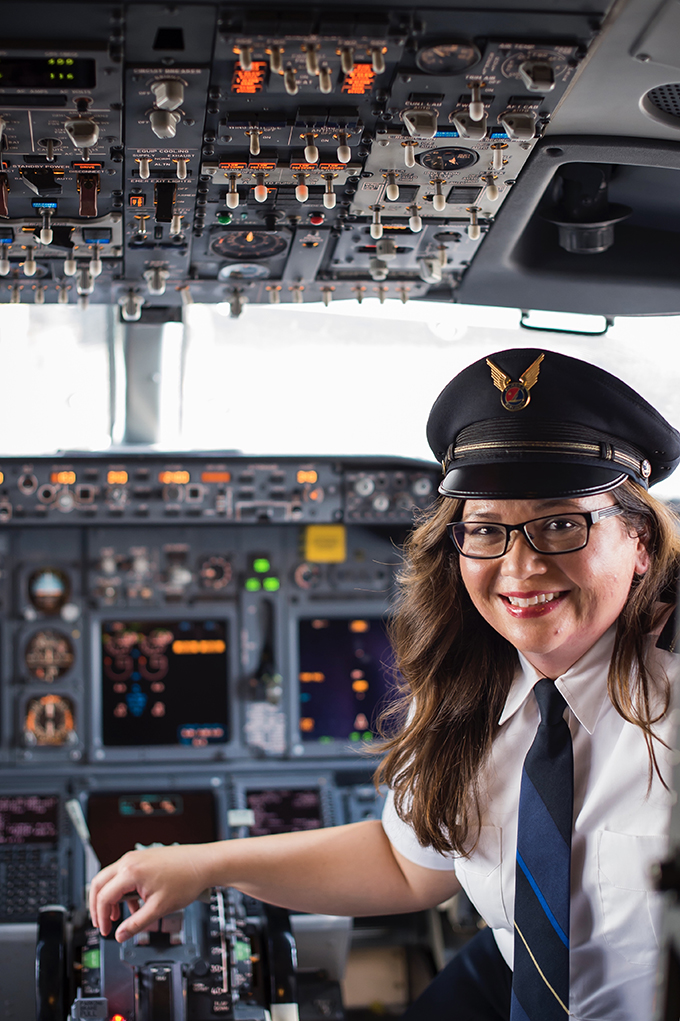By Vivian Nguyen
Northwest Asian Weekly

Chazmin Peters (Photo by Ingrid Barrentin)
For Chazmin Peters, a first officer with Alaska Airlines, aviation was not something that initially came naturally to her.
“Once I knew that I wanted to become a pilot, I realized that I had to be better — I needed to be impressive enough to become one,” said Peters.
Born and raised in Olympia, Peters knew she was destined for the skies after attending an aviation summer camp in Seattle when she was 13 years old. But she cited poor hand-eye coordination, physical ineptness, and mediocre study habits as obstacles to reaching her dream. This self-awareness prompted Peters to become a better student and, when she started high school, she taught herself how to study properly on her own terms.
Peters recalled the first time she earned top marks in a pre-algebra class, and how impressed her parents were. The accomplishment made Peters realize that, though she may not be the fastest learner, she can achieve a goal as long as she has enough time to prepare and study.
She carried this mentality to Big Bend Community College in Moses Lake, where she attended aviation school. Peters concurrently earned her ratings while obtaining an associate of arts from the school. Per the requirement of airline jobs at the time, Peters also earned a Bachelor of Arts in Urban Studies from the University of Washington-Tacoma. After schooling, Peters became a flight instructor, which helped her get the required flight hours she needed to be considered for a professional pilot gig.
Peters’ first airline job was with the New England-based airline Cape Air. Peters flew regional routes across New England, in small planes that required more work and attention to safety than a typical commercial plane.
Still, Peters credits her time with the small airline for honing her skills, especially when Alaska Airlines hired her in 2014. Currently based in Tacoma, Peters said flexibility is one of the biggest joys of working for a major commercial airline. The variety of routes, such as flying to Hawaii or southeast Alaska, make the job satisfying and challenging, respectively.
“I love flying through southeast Alaska because it’s fun — you’re really flying,” said Peters. Alaska’s natural elements, such as terrain and weather, make for a more dynamic environment and introduce unique flight challenges that Peters enjoys navigating.
On race and gender in aviation
According to the Institute for Women of Aviation Worldwide, a nonprofit dedicated to fostering gender balance in the air and space industries, only 6.3 percent of commercial pilots in the United States are women.
Each successful plane landing is an accomplishment for Peters. But it’s also evidence to show skeptics that Peters is a highly-capable pilot. As an Asian American woman, Peters routinely faces microaggressions from male colleagues who question her skills due to her gender or race.
For a minority in a predominantly white and male-oriented industry, performance is often the metric in which one is judged. It’s a pressure that Peters constantly feels in her role — the need to perform flawlessly to prove herself to others.
“Men can be apprehensive, and judge me based on how I look,” said Peters. “But then I fly the crap out of an airplane and then they’ll praise me. If you do a good job, there’s nothing anyone can say about you.”
Diversity comes naturally to Peters given her family make-up. With a Filipino mother, Native American father, Black stepfather, and white stepmother, Peters understands what it means to be immersed in different cultures. It’s actually because of her close relationship with her stepfather that she discovered her love for aviation.
Peters’ stepfather, also a pilot with Alaska Airlines, started Eagles Aviation Camp in 1996 — the same summer camp that originally inspired Peters to pursue aviation. Based in Seattle, the one-day camp introduces kids to the world of aviation through activities, career exploration, tours at the Museum of Flight, and even an opportunity to fly in a small airplane.
Since her first summer at the camp, Peters has grown to help her stepfather run it, and she’s also become a camp director. What she loves most about the camp is helping kids learn and discover the world of aviation.
“Sometimes people helicopter parent too much,” said Peters. “There’s no freedom to let kids explore their own level of leadership and responsibility.”
Peters noted that Asian American parents can be especially guilty of this. To them, aviation careers are labor-intensive and risky. And without parental support, kids become discouraged from exploring non-traditional jobs and instead follow a more traditional path of obtaining a 4-year degree. This diminishes people of color from entering aviation, resulting in lower diversity in the field.
This is something Peters wants to change by educating parents to become better mentors and cheerleaders for their children. She advised parents to help kids find subjects and fields that they enjoy and push them to be successful in that.
While Peters’ future goals include becoming an airline captain, she’s equally focused on mentoring the next generation of aviation professionals.
“I never want to forget that I couldn’t have become a pilot without the help of the people around me,” said Peters. “I wouldn’t have come into this career on my own. That’s why it’s important to pay it forward — I want to return that favor to someone else.”
Eagles Aviation Camp is a series of one-day aviation summer camps held in July. For more information about Eagles Aviation Camp and availability, contact chazmin.peters@alaskaair.com.
Vivian Nguyen can be reached at info@nwasianweekly.com.



